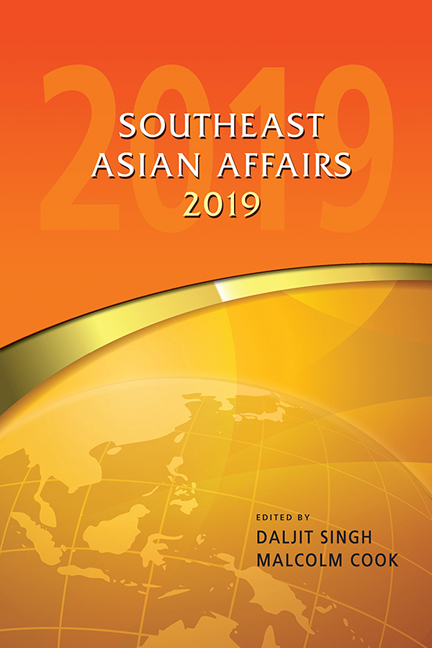Book contents
- Frontmatter
- Contents
- Introduction
- THE REGION
- Challenges to Southeast Asian Regionalism in 2018
- Regional Integration in Asia and the Pacific, and Dealing with Short and Long Term Challenges
- Looking West, Acting East: India's Indo-Pacific Strategy
- An Australian Vision of the Indo-Pacific and What It Means for Southeast Asia
- The Trump Administration's Free and Open Indo-Pacific Approach
- Japan's “Free and Open Indo-Pacific Strategy” and Its Implication for ASEAN
- BRUNEI DARUSSALAM
- CAMBODIA
- INDONESIA
- LAOS
- MALAYSIA
- MYANMAR
- THE PHILIPPINES
- SINGAPORE
- THAILAND
- TIMOR-LESTE
- VIETNAM
Challenges to Southeast Asian Regionalism in 2018
from THE REGION
Published online by Cambridge University Press: 07 September 2019
- Frontmatter
- Contents
- Introduction
- THE REGION
- Challenges to Southeast Asian Regionalism in 2018
- Regional Integration in Asia and the Pacific, and Dealing with Short and Long Term Challenges
- Looking West, Acting East: India's Indo-Pacific Strategy
- An Australian Vision of the Indo-Pacific and What It Means for Southeast Asia
- The Trump Administration's Free and Open Indo-Pacific Approach
- Japan's “Free and Open Indo-Pacific Strategy” and Its Implication for ASEAN
- BRUNEI DARUSSALAM
- CAMBODIA
- INDONESIA
- LAOS
- MALAYSIA
- MYANMAR
- THE PHILIPPINES
- SINGAPORE
- THAILAND
- TIMOR-LESTE
- VIETNAM
Summary
The year 2018 saw various trends and developments that posed challenges to ASEAN and its future. One was the ongoing difficulty the grouping has had in dealing with the Rohingya problem, which reveals the constraints and limitations under which it operates. The Rohingya problem became internationalized as the issue was taken up by international agencies and external governments in the face of ASEAN inaction. Secondly, with regard to the issue of the South China Sea, the United States and China faced off against each other in a way that sidelined ASEAN. ASEAN's relevance to this issue might be ensured in the negotiation of a Code of Conduct (CoC) with China, but 2018 saw little progress on a matter that has been on the table for several decades now. Thirdly, the ASEAN economies were being steadily integrated into a wider region that included its major trading partners and sources of investment. ASEAN's pursuit of broader trade regimes with its external trading partners such as the Regional Comprehensive Economic Partnership (RCEP) and the Trans Pacific Partnership (TPP) pose a major challenge to its centrality. Moreover, the so-called trade war that erupted between the United States under President Donald Trump and China exposed the vulnerabilities of the ASEAN economies, although opportunities were also present. Fourth, the notion of the Indo-Pacific gained currency in 2018, not only amongst ASEAN's external partners but in Indonesia as well. The idea of Southeast Asia that was included in the Bangkok Declaration of August 1967 has been a supporting foundation for ASEAN regionalism, but how this can be reconciled with the notion of the Indo-Pacific will be ASEAN's major challenge.
ASEAN's Rohingya Problem
The Rohingya problem has bedevilled ASEAN for the past three decades. Myanmar's relationship with ASEAN has been troubled ever since the Myanmar military pushed some 250,000 of the Muslim minority from Rakhine State to Bangladesh in 1991 and 1992. The problem has been festering ever since and has demonstrated ASEAN's inability to deal with a member who invokes the non-intervention clause of ASEAN's founding charter, Article 2 of the Treaty of Amity and Cooperation and Article 2(a) of the ASEAN Charter of 2007. The Myanmar military has simply and successfully resisted demands within ASEAN to curb its campaigns against the Rohingya.
- Type
- Chapter
- Information
- Southeast Asian Affairs 2019 , pp. 3 - 20Publisher: ISEAS–Yusof Ishak InstitutePrint publication year: 2019



